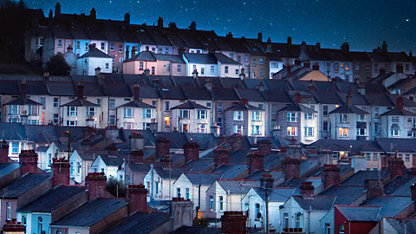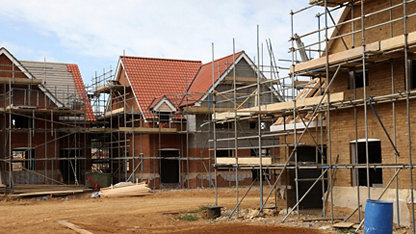Local and devolved elections took place across England, Scotland and Wales last Thursday. Now that the dust has settled, and the results are clear, RICS have analysed the results to understand the implications for the built environment and the work of RICS professionals going forward.
With many new governments and administrations putting sustainability at the heart of the economic recovery from the Coronavirus pandemic, RICS is well positioned use our qualifications, standards and industry leadership to influence and drive forward this change.
England
The Conservative Party made significant gains across England, winning control of 13 councils as well as the Hartlepool by-election.
Metro mayoral elections also occurred in major urban regions including London, Greater Manchester and Liverpool with the respective wins for Sadiq Khan, Andy Burnham and Steve Rotheram.
The re-election of several incumbent mayors within various parts of England will provide a degree of consistency. However, there is also a recognition across all main parties of the need to build greener, more affordable housing, regenerate town centres, and seize opportunities to tackle climate change through the built environment.
- London - Sadiq Khan had set out a 10-point Green New Deal, which includes a specific point about carbon standards for housing.
- Greater Manchester - Andy Burnham has indicated that speeding up progress towards the goal of a zero-carbon Greater Manchester by 2038 will mean retrofitting every single home and he has promised to create a Retrofitting Task Force to help unlock thousands of green jobs and to convert homes across the city-region.
- West Midlands - Andy Street has set out plans for a mass programme of retrofitting people’s homes with energy efficiency measures. He has promised to work with developers who are committed to high-quality environmentally conscious design and build new Zero Carbon Homes for the region.
Our RICS England manifesto sets out the three priority areas - housing supply, high street renewal and construction & infrastructure - where elected mayors can take action to support the built environment. The manifesto includes specific calls for the creation of low-cost, low-carbon, safe homes across all tenures; a commitment to retrofitting, repurposing and renewing of high streets for a post-Covid environment; and the need to embrace modern technologies in construction to create a housing and infrastructure system fit for the future.
Published date: 01 April 2021
Scotland
As expected, the SNP emerged as the largest party but fell one seat short of an outright majority on 64 seats. However, with the Greens adding two seats, there is a relatively strong pro-independence majority in the Scottish Parliament. This sets the scene for continued constitutional wrangling over the coming months and years on the issue of a potential second independence referendum. Indeed, First Minister Nicola Sturgeon subsequently said a second referendum was a “matter of when, not if”.
In the built and natural environment, there is a relatively clear mandate for a bold agenda for reform. Given the lack of an outright SNP majority, the Greens are likely to play a role in shaping the Government’s agenda and passing key legislation. It is, therefore, crucial to look at both the SNP and Green manifestos.
- Housing: Both the SNP and Greens have emphasised the need to build ’20-minute’ and ’15-minute’ neighbourhoods across the country and have set out ambitious goals for the production of affordable and social rent homes. The SNP is also looking to set up a Zero-Emission Social Housing Task Force and introduce a new Housing Standard by 2025. The Greens called for a new Private Rented Sector Regulator, the introduction of a new statutory Habitable Housing Standard, and five-year tenement surveys.
- Sustainable infrastructure: Infrastructure is at the heart of the SNP’s manifesto, with plans for a £33 billion a National Infrastructure Mission that will support up to 45,000 jobs. It will also look to create a National Infrastructure Company to “manage and develop public assets for the public good”. With sustainability also a key tenet of the SNP’s agenda, it will look to develop a ten-year National Strategy for Economic Transformation, alongside a new National Challenge competition, providing funding of £50 million to projects with the “greatest potential to transform Scotland”. A Low Carbon Challenge and Energy Transformation Fund were also included##
- A Land Reform Bill looks set to be introduced, with both the SNP and Greens calling for reform to how public interest is delivered through land transactions and use. The SNP has expressed an intent to use the Bill to improve community ownership and the Greens have called for the Bill to “tackle monopolies, promote fairer management of land, and regulate the sale of land”. For their part, the Greens have also called for significant further investment in green infrastructure, with £7.5 billion public investment across public transport, zero-carbon homes, renewables and the natural environment, with the potential to create over 100,000 jobs.
- High Street regeneration: Cognisant of the significant impact COVID-19 has had on the high street, the SNP has pledged to publish a Retail Strategy to help the sector “innovate and thrive, and become an exemplar in inclusive growth”. In order to shift the balance of power, it has also announced the formation of a Community Wealth Building Act, that will require local authorities to increase local procurement and the use of small businesses, while reinvesting taxpayer money in the local community. The Greens have echoed such calls, calling for a Green Transformation Fund and greater support for short supply chains.
Such commitments echo the broad direction of travel as set out in RICS’ own manifesto for Scotland, including the creation and retrofitting of low-cost, low-carbon, safe homes for all, and ambitions to regenerate high streets and town centres. We look forward to working with our members, the Government, and policymakers across Scotland to deliver on such ambitions over the coming years.
Wales
Having been the largest party in the Welsh Parliament – and subsequently the Party of Government - for the last 22 years, Welsh Labour has once again secured the top position within the Senedd – gaining one seat to clinch exactly 50% of seats in the Senedd.
The last five years in Wales witnessed significant changes to the built and natural environment.
The Renting Homes Act introduced complex reform and controls to the tenant/landlord relationship. The Agriculture Bill dramatically increased the role and value of diversification within land management. The Welsh Government also declared a climate emergency, and through which, launched the Innovative Housing Programme to explore future green housing developments, scrapped proposals for an M4 relief road, and nationalised the rail network with ambitious metro infrastructure plans.
Looking forward, Welsh Labour's manifesto expands on its last five years in government including proposals for:
- 20,000 new, low carbon social homes and investment in modern and greener construction methods.
- Implementing changes to leaseholds and building safety.
- Committing to developing net-zero carbon public infrastructure, including through the 21st Century Schools & Colleges Programme.
- Putting decarbonisation at the centre of their job creation programme, including investment in training and upskilling.
- Creating more agile town centres while seeking 30% target for permanent remote working.
- Investing in sustainability by delivering on the Wales Transport Strategy and active travel ambitions while also support innovative renewable energy technologies including tidal lagoon power.
Our RICS Wales Manifesto called for parties to create greener, safer homes across all tenures, revitalise our high streets and invest in sustainable infrastructure. RICS professionals are well-positioned to support the Welsh Government with their ambitions over the next Senedd term.
Properly investing in the built environment will be critical for Wales to build back better from the Coronavirus pandemic, both in the short and long term. RICS worked closely with the previous Welsh Government on several critical issues, and we look forward to continuing that work.
Supporting change
RICS is committed to working with governments, stakeholders and built environment professionals to effect positive change in the built and natural environments. Through our professional qualifications, thought leadership and property standards, RICS is taking leadership in addressing the challenges of the future.
The RICS Building Carbon Database and Whole Life Carbon Assessment will help to collect, compare, and measure the carbon costs in construction – critical for delivering low-carbon, green infrastructure.
The Home Survey Standard will set the industry benchmark for assessing good quality housing stock, which will be supported by the RICS Low Carbon Homes Consumer Guide to promote good energy performance practice.
Given the prominence of building safety over the last few years, RICS is undertaking significant work to address the issue. The EWS1 Survey, action to address PII access and the development of hundreds of new fire safety assessors in the UK will work towards addressing the challenges facing those in high-rise blocks.
Furthermore, RICS held a pivotal role in developing the UN-adopted International Fire Safety Standards – which created and agreed to fundamental principles towards tackling fire safety. New governments and administrations should seek to agree to and build on this adoption, delivering on its commitment to creating safer environments across the UK.















